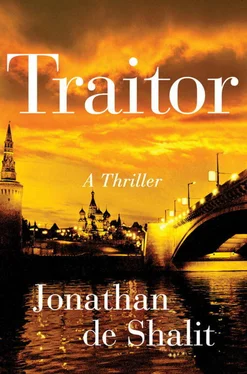Insofar as Israel itself was concerned, the attitude of the East German leadership was one of indifference, as if there was no connection between the activities of the Palestinian organizations East Germany was funding and the state against which they were fighting. As a result, the East German intelligence services showed very little interest in information about Israel, and an Israeli walk-in wasn’t going to make any impression at all on the Stasi itself or the party leaders in Berlin. But both Gunther and Markus knew—the one based on a gut feeling, the other with absolute certainty—that a high-ranking asset in Israel would certainly spark a great deal of interest among the big brothers at the Lubyanka, KGB headquarters in Moscow. Because as far as Moscow was concerned, Israel was already an entirely different story. In all the power struggles waged between the KGB and the Stasi, it was plain to see which of the two organizations was the bigger, the stronger, the more senior. On a professional level, nevertheless, the two organizations were in competition—not openly perhaps, but certainly not entirely hidden. On several occasions, the Stasi’s foreign division had reaped success where the KGB had failed. The East Germans were at a distinct advantage, of course, with respect to West Germany. The shared national identity, the common language, family members living on both sides of the border, a single history and shared crimes from the time of the war—these were all factors that gave the Stasi the upper hand in West Germany in the continuing arm-wrestling contest between the organizations. When Markus showed up at KGB headquarters in Lubyanka Square, his character and capabilities weren’t the only things that spoke for him. He, personally, was viewed as a man whose opinions and advice were worthy of attention. But the agents his organization had successfully recruited and who were often handled in keeping with instructions from Moscow were his primary assets.
The question that was troubling Markus and Gunther was whether the young and cynical Israeli could indeed become a senior asset at some point in the future. In the company of Markus, Gunther felt at last as if he no longer needed to step lightly. There were moments even when he allowed himself to be Werner and not Gunther, the legendary field operative and recruiter of agents. Settled back now in the shabby armchair, his tie loose and the top button of his shirt open, Gunther spoke candidly:
“Truthfully, after all, Markus, we don’t know. How could we possibly know where this guy will be ten to fifteen years from now? Anyone offering a definitive and decisive opinion on the matter would be guilty of deception, and not mere deception, but deception of the worst kind—self-deception. Tell me, can I really know if this guy is going to go the distance in the world of politics, which is nothing more than a quagmire of endless manipulations and unbridled lust for power…?”
Markus cleared his throat and a mischievous glint appeared in his eyes.
“I’m talking, of course, about politics in the West,” Gunther said with a smile, utterly devoid of the need to justify himself to Markus, but conscious nevertheless of his big mouth and his, and everyone’s, constant need to cover their asses in the event they ran into someone whose sense of humor and tolerance weren’t at their best.
“How can we be sure,” he continued, “that his abilities and talents and drive won’t be redirected toward, let’s say, the business world, leaving us with a fantastic agent—a real-estate mogul or wealthy lawyer or investment house CEO—but with zero intelligence?”
“Tell me,” Markus said, interrupting Gunther, “what’s happened to your professionalism, your hunter’s patience? Where’s this doubt coming from? After all, once we get in on the act, we also have the ability to influence the manner in which things move forward. We shape the reality with our own hands, and we don’t make do with simply gathering intelligence about it. This guy has placed himself in our hands, even if he believes he’s in the hands of the Americans. We know, after all, how to manage such operations—very slowly, patiently, thoughtfully. We’ll get him accustomed to his ties with us, to the sense of adventure, to the thrill of secrecy, to the money filling his pockets slowly but surely, to the gradual and moderate climb in his standard of living. Just like a frog in a pot gets used to water that’s boiled slowly. The frog will allow itself to be cooked alive without even considering the option of jumping out of the boiling water,” said Markus, who was known for his descriptive imagery. “Little by little, you’ll mold this material,” he added in a low and warm voice, “and believe me, it’s still soft. Shape it in your image. Or in the image of whomever you send to him. He’ll want to please you; he’ll want you to be proud of him; you’ll be the father he doesn’t have; you’ll be the person he thinks about at night; and he won’t want to disappoint you. For you, he’ll work his way into positions we view as significant, he’ll forge ties with people who interest us. And even if he’s drawn into the world of business, we’ll make sure he snakes his way in and out of public roles, as close to the plate as possible. And you and I will be with him, or behind the scenes, all the time; we’ll feel him; and without his even knowing it, we’ll get under his skin and through to his very soul,” Markus said, taking the trouble to dryly add for the sake of required Marxist correctness, “the nonexistence of which is unquestionable.”
“You know,” Gunther said, still clinging to his skepticism, “that handling an agent under the guise of an American is no light task at all, and a major operation. I’ll take charge of the handling to begin with, but further down the line we’re going to need to make use of our most valued tools, individuals who’ve been stationed in the United States for years, as Americans for all intents and purposes, awaiting our signal. We’ve invested so much in them. Using them for a project that is just now getting started and whose development and outcome we truly cannot foretell is a big risk.”
“My dear Werner,” Markus responded, addressing Gunther by his real name, “if you’re still living under the impression that we’re on the brink of a Third World War in which we’re going to deploy guerrilla forces to launch assaults on the American enemy’s home front, then something really has gone wrong with you. Don’t be the last disciple of propaganda that no one else believes any longer. We’ve built up assets. We’ve invested years of work in them. And for what? To never actually use them? Is it our ultimate goal to have them forget they are East Germans, to have them think they are Americans off the Mayflower , there to plant and water flower beds in their picturesque towns in Vermont or Idaho? Werner,” Markus said, leaning toward him in a gesture of affinity and affection, “I have faith in your experience and gut feelings, and I have faith, too, in your agent at the American embassy in Rome. You’re the old lions in this dirty game, this wonderful and dirty game,” he added contemplatively. “If the two of you feel this guy has something to offer, I’m with you on it. And if our good friends at the Lubyanka want him, we’ll do the work for them. Earning Brownie points in Moscow can’t do us—you or me—any harm at all. You never know,” he added in earnest, “you never know when we may need them.”
DRESDEN, SEPTEMBER 2012
The cold had taken up permanent residence in Marlene Schmidt’s bones. Her layers of clothing were of no help, and the same could be said for the piping-hot heating system in the small public housing apartment in which she lived on the outskirts of the city. At the age of eighty-seven, with terminal bone marrow cancer nesting in her body, feeling warm and comfortable wasn’t an option for her that gloomy winter. The coming spring, and the summer to follow, with the apple trees in full bloom and the magnificent flotilla of white swans on the river, wouldn’t be hers to see again. Her days on earth were drawing to a close, thus dryly said her sharp mind, and she felt no sadness or sorrow about her dwindling life, only a bitter sense of disgruntlement, like a mild heartburn that rises up from the stomach to the throat. So many years of service and loyalty down the drain, service and loyalty to a country and an organization that were the essence of her life, that were supposed to survive for all eternity and to create—yes, despite everything—a new and more just world.
Читать дальше












